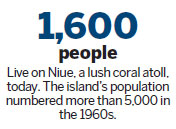Anybody home? Lush Pacific atoll struggles with shrinking population

It was a school once, but there are no children anymore. The lonely building on this remote Pacific island now contains only a punching bag that someone has strung from classroom rafters and a note scrawled on the chalkboard in Niuean: "Keep this place clean," it said, "so it stays beautiful."
While much of the world worries about how it will accommodate rapidly growing populations, some islands in the Pacific face the opposite problem: how to stop everybody from leaving.
The population decline on Niue, a lush coral atoll about the size of Baltimore, has been steady and relentless. In the 1960s, there were more than 5,000 people living here; today, there are fewer than 1,600. Fifteen times as many Niueans, some 24,000 of them, now live across the ocean in New Zealand, 2,400 kilometers away.
The stories, songs and language that developed into the Niuean culture over a span of more than 1,000 years are at risk of vanishing.
Speedo Hetutu, 54, attended the old school in the town of Avatele before it was abandoned and later used for workouts. There used to be six primary schools on the island; now there is only one. Other buildings where people used to work, pray or live now sit empty and in disrepair.
"People wanted to go away to look for a better life," Hetutu said. "People are still searching."
Other Pacific islands face similar struggles. The CIA estimates the population of the Cook Islands is declining by 3 percent per year, a rate second only to war-torn Syria.
The exodus from Niue has been particularly acute because of its connection with New Zealand. Niue is self-governing but in free association with its wealthier neighbor to the south, and Niueans are automatically New Zealand citizens.
While that relationship has lured away thousands of young Niueans, it has also paid the bills for those who have remained. New Zealand has helped establish a $44 million trust fund and gives annual aid that amounts to about $10,000 per resident, helping fund the government work that accounts for most of the island's jobs.
Niueans see New Zealand as a land filled with opportunity, said the Rev. Falkland Liuvaie, 52, a Presbyterian minister who moved to the capital, Wellington, seven years ago.
The oral traditions that were once strong on the island are in danger of disappearing, he said. He remembered as a young boy going into his grandfather's bedroom at 5 o'clock in the morning, before he went to work, to hear him tell stories about fishing and working in the bush.
"The more you stay away from home, the more you embrace other cultures, especially the Western culture," he said. "There's nothing much you can do about it."
Yet on Niue there is a sense of optimism, a belief the exodus might finally be halting. That's thanks mainly to more tourism money coming in, and a renewed sense of tradition. Government figures indicate that about 7,000 people visited the island last year, double the number from just six years earlier.
Roy Pavihi, 26, is part of a youth group that's learning to make canoes, using traditional tools like chisels and modern ones like electric planers. "We need to follow the skills of our forefathers," he said. "Our village was renowned for fishing and canoes."
Niue Premier Toke Talagi remains bullish on his country's future.
"Our task at the present moment is to use tourism to try to create opportunities so that Niueans will consider Niue again as a place to come back and live," he said.
(China Daily 07/14/2014 page10)














